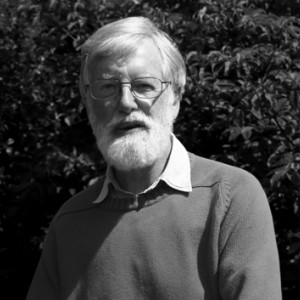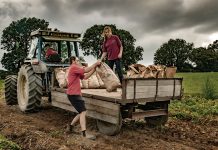A one year contract with the New York Botanical Gardens turned into a 25 year career studying plant species in the Amazon rain forest, for Lyme Regis resident, Professor Sir Ghillean Prance. He returned to England in 1988 to become Director of the Royal Botanic Gardens at Kew. He is currently working on an Argentinian research project affiliated with the Eden Project in Cornwall. The project is an attempt to find ways to conserve the largest area of Atlantic rainforest in the world.
Among those who have spent their lives studying and documenting the plantlife around the rainforests, few have attained greater prominence. As one who has seen, first-hand, the damage that we are doing to our natural habitat, he feels that people in his field must add their voices to the growing chorus of those calling for a halt to ‘progress at any cost’. In June,as part of the Beaminster Festival, he will be giving a talk entitled ‘The Biological Evidence for Climate Change’ at St Mary’s Church in Beaminster. It is a subject he believes now carries weighty evidence and that every person can do their bit to prevent more damage to our environment.
“I think now” he says, “any biologist who is studying natural history, in any way, is very aware that things are changing, and there is so much evidence from botany and zoology that we have to get concerned and interested in climate change. My research has been in classifying plants, now I see the things that are happening. I do need to draw attention to the world that this is a serious problem that we do need to be addressing. Because it’s no good me trying to preserve a rare and endangered species or even a patch of forest, if the climate changes so rapidly that that gets rid of it anyway. Because that’s the sort of thing that is beginning to happen!”
“One of our botanists at Kew studied for about 40 years the flowering of about 300 species there – when they first come into flower etc. If you take an average of all the things he studied – trees flowers herbs, cultivated and wild – things are flowering about eight days earlier than they were 25 years ago. The interesting thing is, I edit a journal called Biodiversity and Conservation, and I received a paper just at the same time from botanists at the Smithsonian in Washington – a study of twenty years of trees in the Washington DC area and the data was almost identical – flowering was seven days earlier. Then there was a paper from Japan with the same findings.
“There’s so much data coming in now. People who study birds are seeing them coming earlier and staying later. One of the real difficulties of that is, that, when the bird’s chicks are born earlier than normal, the insects haven’t peaked – they were in synchrony but now they’re not. For example our songbirds are not able to breed so well because they are out of synchrony with the food. People ask why the insects haven’t changed and it’s because different creatures are affected by different stimulus. With insects it is the amount of daylight that affects them, and that of course isn’t affected by climate change.
“Two years ago I was on the Amazon at the time of a very bad drought and we kept running aground in places that we never had before. It was because the river was so low and that was the most drastic result of climate change. In the areas where there has been a lot of deforestation the climate has got a lot drier, so particularly in the southern part of the Amazon there is a tendency towards drought. If that goes on the forest can’t survive!
“People think that because it has been in the news so much, that deforestation is not such a problem any more, but that’s not the case. A recent article I read highlighted the fact that one day’s deforestation is more damaging to the planet, than the total carbon emissions from one day of all the flights around the world.
“One of the major ways of stopping climate change is to stop deforestation, while working on reforestation at the same time. About 22% of the increase in carbon dioxide is from deforestation and the rest is from fossil fuels. That is quite a large chunk of it.”
Sir Ghillean is also aware of some of the changes occuring closer to home, that are directly affected by climate change. He says, “Another area that I see it is – we have some very rare alpine plants in the UK, they are just in the higher parts of the Scottish and Welsh mountains, and as the climate gets warmer they need to move higher. They are migrating upwards and soon they will become extinct because there isn’t an alpine zone. In the arctic the plants are also gradually migrating further North.”
Apart from being aware and concerned about all the damage being done to our planet because of climate change, Sir Ghillean has seen many positive advances and can see ways in which both major industry and individuals can make a change. He cites news about a visit by four members of Greenpeace along with four executives from the fast food chain, McDonalds, to the rainforest area, to ensure that the chain was not buying soy cultivated on land recovered by demolishing rainforest. “An unlikely combination of friendships” he says, “but because McDonalds are buying soy to feed chickens for their McNuggets, they do not want to buy soy from the Amazon, so they went there to check.”
He believes that there is so much more power in industry than in Governments, that it is very much the way to go. “It’s a very big step forward. I think the answer to environment in many cases is collaboration between industry and the environmentalists – not just opposition.” Other steps forward include those initiatives organised by religious and other non-governmental organisations. He says, “Last year I visited an area right on the main Amazon river for a very influential symposium sponsored by his All-Holiness the Patriarch of Constantinople, in other words, by the orthodox church, and one of the results of the publicity from that symposium is, that Brazil has actually put a moratorium on cutting down any more of the Amazon rainforests for soy. The question now is, are they able to monitor this, and will it stop? It looks as though the world’s attention has got on the problem and that maybe not much more rainforest will be cut down for soy, but we’ll see. That moratorium was in October of last year, so it’s too early to see whether it will be a success.”
Sir Ghillean also believes in the power of the individual, he talks about how important it is for everyone to try to change aspects of their lives to help combat climate change. Not only is it important for people to try to create a better personal environment, it is the example set by individuals that can make governments act. He says, “If individuals don’t do it and set the example, I don’t think we’ll get the governments to change, and I think that one of the very important things is, that if individuals do it, then they can pressure their governments to do things better. Every little bit counts.”










